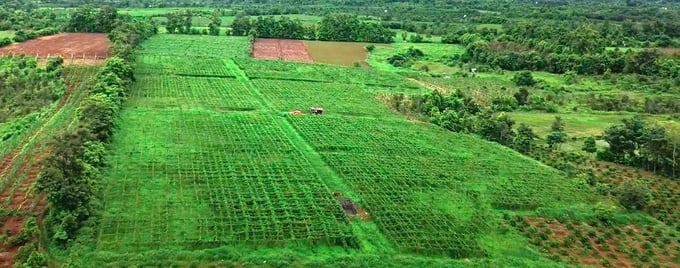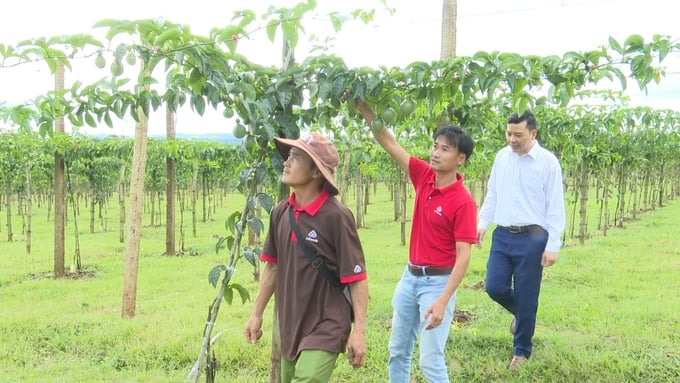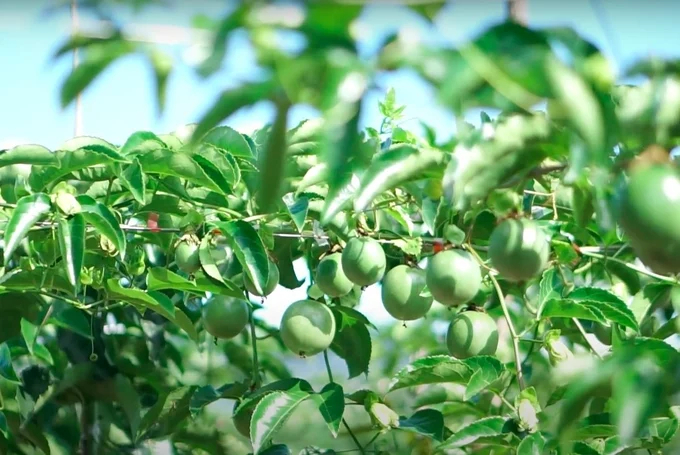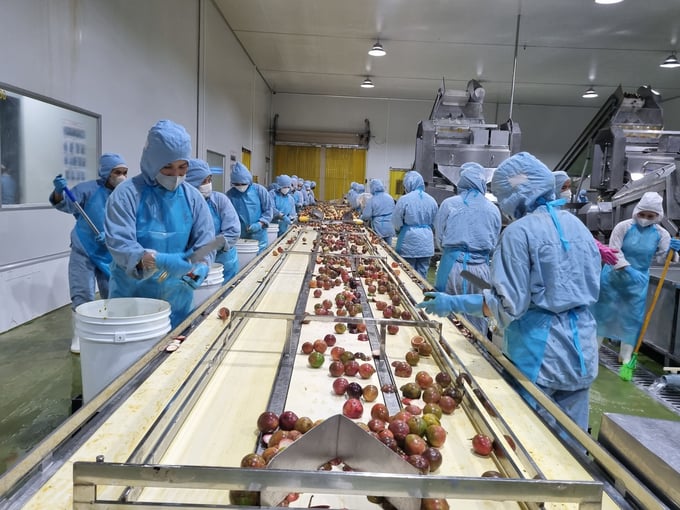May 30, 2025 | 00:36 GMT +7
May 30, 2025 | 00:36 GMT +7
Hotline: 0913.378.918
May 30, 2025 | 00:36 GMT +7
Hotline: 0913.378.918

There are still not many passion fruit gardens that are invested in and participate in chain links with businesses. Photo: Tuan Anh.
Amidst the upheaval that has led to the destruction of numerous passion fruit gardens due to plummeting prices and rampant epidemics, Nafoods stands as a shining example of meticulous planning and effective production links. Despite the challenges faced by many, Nafoods has strategically planted lemon gardens interconnected along the value chain, with a steadfast goal of exporting their produce.
Our journey took us to the 1.6-hectare passion fruit garden of Mr. Bui Van Toai's family in Thong Ngo village, Ia Kenh commune, Pleiku city. At first glance, the garden resembled an eco-tourism oasis with a meticulously designed layout. Passion fruit vines were neatly aligned in straight rows, creating a visually appealing pattern. Mr. Toai reinforced the lemon garden with durable concrete pillars, and beneath it lay a carefully designed sprinkler irrigation system.

The passion fruit garden is meticulously cared for by Mr. Bui Van Toai's family (Thong Ngo village, Ia Kenh commune, Pleiku city, Gia Lai). Photo: Tuan Anh.
With over four years of experience cultivating passion fruit, Mr. Toai emphasized the importance of organic growth for export to the European market. Learning from Nafoods, he adopted their guidance on varieties, care processes, and seedling selection. Remarkably, more than 70% of the family's lemon garden met export standards to Europe by the end of last year, showcasing the success of Mr. Toai's commitment to a meticulous care process.
Nafoods has emerged as a pioneer in linking production and consumption in Gia Lai's passion fruit hub. The company has invested in a modern passion fruit seedling production facility and a quality inspection room, ensuring high-quality seedlings for supply to units, cooperatives, and businesses. Collaborating with 28 cooperatives and 2,000 farming households covering over 2,200 hectares, Nafoods plans to expand passion fruit areas in key provinces of the Central Highlands.

Passion fruit that is properly cared for will qualify for export to Europe and is still purchased at quite high prices. Photo: Tuan Anh.
Mr. Ho Hai Quan, Director of the Central Highlands growing region of Nafoods, highlighted the need for standard technical processes in passion fruit production. While farmers often rely on experience, Nafoods sees an opportunity to guide them in applying standard techniques, enhancing sustainability, minimizing risks from natural disasters and epidemics, and ensuring high-quality, traceable products.
Nafoods' technical team advises farmers on planting, care, predicting epidemic risks, and optimizing harvests for maximum efficiency. By adhering to stringent quality controls, including pesticide residue requirements, farmers can diversify consumption channels, providing stability in price and consumption even in the face of price fluctuations.
According to Mr. Quan, cooperation with farmers and the application of standard processes are essential for sustainable passion fruit cultivation. This approach not only meets export standards but also supports local farmers in navigating the complexities of the global market.

Nafoods is collaborating on the production, consumption and processing of passion fruit in the Central Highlands provinces. Photo: Tuan Anh.
However, challenges persist in the passion fruit industry. Mr. Nguyen Tan Cong, Director of Nam Yang Agricultural and Service Cooperative, identified two critical issues: rapid, unplanned expansion of passion fruit cultivation and insufficient capacity for deep processing. He stressed the need for clear planning, suitable growing areas, and the development of large-capacity processing factories to prevent surplus and price fluctuations.
Mr. Luu Trung Nghia, Director of the Department of Agriculture and Rural Development of Gia Lai province, attributed the instability in passion fruit prices to uneven development and a lack of tight production links. To overcome these challenges, he emphasized the importance of businesses in developing standard growing areas, ensuring quality, and creating products that meet market requirements.
Mr. Nghia further stated that businesses must collaborate with farmers through cooperatives, supported by government and agricultural agencies. This collaborative effort aims to manage growing areas with standardized codes, ensuring the necessary quantity and quality demanded by businesses. State agencies will play a crucial role in supporting certification activities to standardize growing areas, control varieties, input materials, pesticides, and enhance the overall quality of passion fruit cultivation.
In November 2023, the Vietnam Agriculture Newspaper, the Department of Agriculture and Rural Development of Gia Lai province, and related units under the Ministry of Agriculture and Rural Development will organize the Forum "Identifying the current situation of production, processing, and consumption of passion fruit and solutions to develop the sustainable passion fruit industry." The forum aims to launch the Campaign Committee of Gia Lai Province Passion Fruit Association, providing a platform to address and resolve challenges in the passion fruit industry, promoting sustainability and growth. The event will be broadcast live in Gia Lai province and online to approximately 500 locations nationwide.
Translated by: Quynh Chi
/2025/05/25/4127-3-073637_820.jpg)
(VAN) Thanks to the promotion from an FAO-implemented project, vegetable production in greenhouses in Moc Chau has seen strong development, from 1.5 hectares in 2021 to nearly 50 hectares in 2024.

(VAN) FAO has recently supported USD 140,000 to implement the project 'Risk mitigation human-animal interface risks through disease control initiatives in pig farming.'

(VAN) The People's Committee of Tra Vinh province has approved an adjustment to the investment policy for the Green Hydrogen Plant project, increasing its area to approximately 52.76 hectares.
![Reducing emissions from rice fields: [2] Farmers’ commitment to the soil](https://t.ex-cdn.com/nongnghiepmoitruong.vn/608w/files/news/2025/05/05/dsc08881jpg-nongnghiep-140632.jpg)
(VAN) Clean rice cultivation model in Thuong Tan commune, Bac Tan Uyen district, is assisting local residents in achieving sustainable agriculture by substantially reducing costs, increasing productivity, and protecting the environment.

(VAN) At the conference to disseminate Resolution No. 68, AgriS introduced its digital agricultural ecosystem and reaffirmed its commitment to accompanying the Government in promoting private sector development and sustainable agriculture.

(VAN) 'Blue Ocean - Blue Foods' initiative is designed to restore marine ecosystems and establish sustainable livelihoods for local communities by cultivating a minimum of 1,000 hectares of cottonii seaweed in the first three years.
/2025/05/21/4642-3-112707_603.jpg)
(VAN) The V-SCOPE project has made direct contributions to three out of six pillars of the Comprehensive Strategic Partnership between Vietnam and Australia.